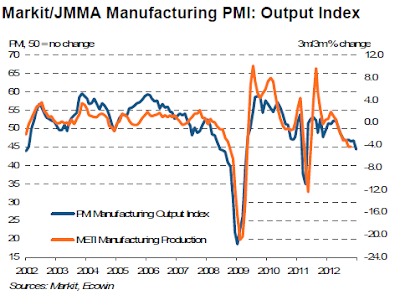Looking for a synopsis of the problems facing Spain? A summary of bullet points I gathered from the Spiegel article
Evictions Become Focus of Spanish Crisis shows just how hopeless the situation is.
- There were a record number of evictions in 2012, foreclosures are expected to increase in 2013.
- Some 400,000 eviction proceedings have been opened in Spain since 2007, with roughly half of the families involved having already lost residential properties due to foreclosures. That means Spain is only half-way through the crisis.
- There are now 1.7 million Spanish households in which not a single family member still earns a salary.
- 4 million people have lost their jobs since 2007
- 27 percent of the population lives below poverty level
- Evictions now affects pensioners, who have used their own homes as collateral to take out loans for their sons and daughters
- A joint study by UNICEF, Oxfam and Doctors Without Borders concluded that the country will need over 20 years to regain the standard of living it attained in the prosperous, pre-crisis years.
- In the Catalonia region, unemployment is 26 percent
- Youth unemployment is over 50%
Social TrapSpanish Prime Minister Mariano Rajoy has issued a moratorium on foreclosures for "extreme hardship" cases. The definition of "extreme hardship" is "families with two children and an annual income of less than €19,000, more than half of which has to be used for mortgage payments." Single parents with children under the age of three also qualify.
Notice that the hardship rule still requires over half of income to go to mortgage payments. Meanwhile interest accrues indefinitely.
There is no way for these families to ever pay back debts accumulated at or near the height of the bubble.
If there are evictions people are thrown out on the street. If there are no evictions, then there is no way for banks to sell the properties to someone who is able to afford mortgage payments.
Euro TrapIn mid-December, Spain received nearly €40 billion ($53 billion) from the European Stability Mechanism (ESM) to restructure its ailing banks. Yet every day Spanish banks acquire more properties not marked-to-market.
Moreover, moratoriums delay the process as interest accrues.
The longer Spain tries to stay on the euro, the deeper Spain goes into debt to the rest of the EU. This is what happened to Greece, and the result was the rise of "Golden Dawn" a neo-Nazi group.
Constitutional Crisis There are no sign of Nazism in Spain. However,
Pro-Referendum Parties Won 87 of 135 Seats in Catalonia and a constitutional crisis is brewing as Catalans wish to secede from the rest of Spain.
Every day, bad debts mount at Spanish banks.
Catch 22 of SortsOn December 19, I reported
Loan Default Rate Hits 11.23% in Spain, a New Record; Construction Defaults Hit 26.4%; Credit Plunges 5%Can anyone tell me how Spain can possibly exit their trap that does not involve Germany pouring vastly more money into Spain?
The only way I can come up with is default with Spain leaving the Euro.
Sooner Spain Leaves the Euro the Better for EveryoneNote that the ECB, IMF, and the rest of Europe (including Spain), threw money at Greece, turning a relatively small problem into a much bigger one. As Greece has shown, the sooner a country leaves the Euro, the better off everyone will be.
So when does Spain, or Germany come to its senses? Either one will do.
In the meantime, politicians will kick the can for as long as they can, making the situation messier and messier along the way.
Pick Your Poison The bottom line is Germany will pony up (and by pony up I mean "give" not lend) massive amounts of money to Spain, or Spain will have no choice but hard default.
- Ultimately, a charismatic politician in Spain will blame Germany, blame the euro, and pledge to default. That politician will be elected.
- Alternatively, a charismatic politician in Germany will get tired of making handouts to the club-med states and promise to put Germany back on the Deutschmark. That politician will be elected.
This is a clear case of pick your poison, and Germany will take a hit one way or another. Timing is the only uncertainty
Mike "Mish" Shedlock
http://globaleconomicanalysis.blogspot.com
















